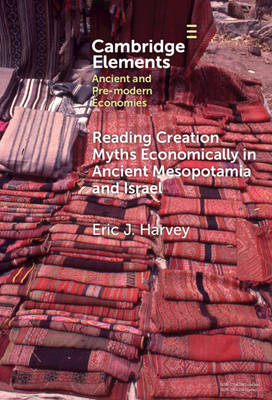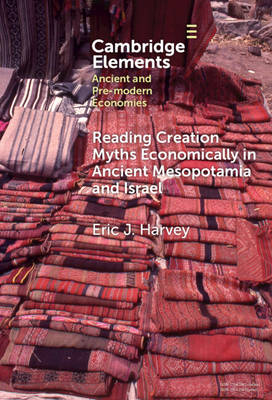
Bedankt voor het vertrouwen het afgelopen jaar! Om jou te bedanken bieden we GRATIS verzending (in België) aan op alles gedurende de hele maand januari.
- Afhalen na 1 uur in een winkel met voorraad
- In januari gratis thuislevering in België
- Ruim aanbod met 7 miljoen producten
Bedankt voor het vertrouwen het afgelopen jaar! Om jou te bedanken bieden we GRATIS verzending (in België) aan op alles gedurende de hele maand januari.
- Afhalen na 1 uur in een winkel met voorraad
- In januari gratis thuislevering in België
- Ruim aanbod met 7 miljoen producten
Zoeken
Reading Creation Myths Economically in Ancient Mesopotamia and Israel
Eric J Harvey
€ 112,95
+ 225 punten
Uitvoering
Omschrijving
Creation myths in the ancient Middle East served, among other things, as works of political economy, justifying and naturalizing materially intensive ritual practices and their entanglements with broader economic processes and institutions. These rituals were organized according to a common ideology of divine service, which portrayed the gods as an aristocratic leisure class whose material needs were provided by human beings. Resources for divine service were extracted from the productive sectors of society and channeled inward to the temple and palace institutions, where they served to satiate the gods and support their human servants. This Element examines various forms of the economics of divine service, and how they were supported in a selection of myths - Atraḫasis, Enki and Ninmaḫ, and Enūma Elis from Mesopotamia and the story of the Garden of Eden from the southern Levant (Israel).
Specificaties
Betrokkenen
- Auteur(s):
- Uitgeverij:
Inhoud
- Aantal bladzijden:
- 88
- Taal:
- Engels
- Reeks:
Eigenschappen
- Productcode (EAN):
- 9781009559881
- Verschijningsdatum:
- 4/09/2025
- Uitvoering:
- Hardcover
- Formaat:
- Genaaid
- Afmetingen:
- 152 mm x 229 mm
- Gewicht:
- 290 g

Alleen bij Standaard Boekhandel
+ 225 punten op je klantenkaart van Standaard Boekhandel
Beoordelingen
We publiceren alleen reviews die voldoen aan de voorwaarden voor reviews. Bekijk onze voorwaarden voor reviews.









